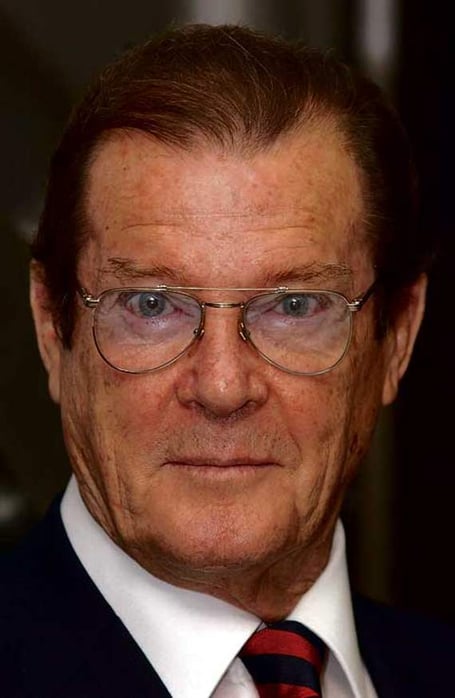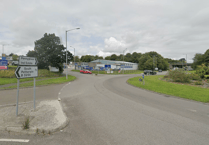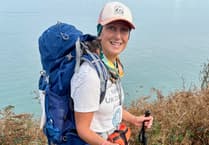A FORMER student of Launceston College has paid tribute to Sir Roger Moore, having interviewed him three years ago.
Duncan Williams attended the same school as his Bond film hero and was delighted when Cornish based biographer Frank Worrall invited him to meet the man who portrayed Bond in seven films.
Mr Williams, who interviewed Sir Roger for an edition of Sorted magazine in 2014, said: “He impressed me as a genuinely good man, dedicated to charity work and committed to fund raising for the United Nations right up until the end.
“I said I’d gone to Launceston College. You definitely got the impression he didn’t like it there! I wanted to suggest the experience of being evacuated and going to the college might have affected his later life — wanting to help evacuees and people in crisis because of war. It’s coming to light that he worked with a great number of charities,” — in later life Sir Roger helped vulnerable children as a UNICEF ambassador. He was knighted in 1999 for his efforts.
Mr Williams wrote in 2014 that Sir Roger’s story as an evacuee was unusual because he was evacuated twice. First to Worthing in Sussex, where he suffered homesickness before being ‘carted’ back home by his policeman father, George.
George then sent Roger and mother Lillian to stay in Chester, but because no bombs had dropped on London by 1940 they returned home — only for Roger to have to be evacuated again when London was blitzed.
He attended Battersea Grammar School before he was evacuated to Holsworthy during World War Two. From there, he attended Launceston College and was then educated at Dr Challoner’s Grammar School, in Amersham, Buckinghamshire — but he said studying at Launceston College was not to his taste.
Sir Roger told Mr Williams: “I can’t say that I liked Launceston College, possibly because I was expected to study hard. I wrote to my parents begging to come home and adding that I’d happily cycle all the way back to London as I only had sixpence and that would not buy a train ticket.”
In fact, as Sir Roger relayed to Mr Williams, it was a scam to get his parents to feel sorry for him — he didn’t even have a bike! The ticket for the train journey back to London promptly arrived from them in the post.
The Post previously featured a number of articles about Sir Roger’s links to the local area.
In the June 20, 1964 edition of ‘The Post and Weekly News’ an article Post reporters were able to track Sir Roger down and discovered more about his links to Cornwall and Devon. It read: “As we reported last week, we’ve been doing a little ‘detective work’ into the background of Roger Moore, who plays the part of ‘The Saint’ in the popular Westward Television series based on the Leslie Charteris character who used to be described as ‘The Robin Hood of Modern Crime.’
“After ‘tracking him down’ in this country and abroad, we did find out from Roger Moore himself that he did have a connection with this district, but it dates back to his boyhood and all he could remember after this lapse of time was that he went to Launceston College for a brief spell when evacuated from London and that he stayed on a farm at or near Holsworthy with a family called, he thought, Allen.”
After publishing these details Mrs Violet Allin, of Clawton, promptly contacted the Post to ‘fill in the gaps’.
The article said: “Publication of those details was a further step in our ‘detection’ campaign and we asked the aid of readers in filling out the picture. That, as we had hoped, paid off promptly, on Saturday morning, one of the first telephone calls to our office was from Mrs Violet Allin to tell us that Roger had got the name right, if not the spelling. But it wasn’t at Holsworthy he stayed: it was Clawton, where Mrs Allin and her husband, Mr W H Allin, were then farming at Kempthorne. They have now retired and live at Sanctuary, Bridgerule.”
Mrs Allin said she remembered Sir Roger well but had no idea he had become a famous TV star. She said: “I’ve never seen the programme, but I shall certainly be watching tonight. I had no idea what had become of him until I was scanning through the ‘Post’ last night.”
She explained that Sir Roger was evacuated down to Devon from London with the Nine Elms School. They came to Tetcott, where the boys were billetted out in local homes and lessons were conducted in the Methodist Sunday School there.
Mr and Mrs Allin lived in Clawton parish with their two sons, Denzil and Leighton, but Kempthorne is on the borders of Tetcott, and when the evacuees arrived, Mr Allin, who was a special constable, went to Tetcott to assist with the billeting arrangements.
In fact more youngsters turned up than were expected and to his wife’s surprise, Mr Allin came home that night with three boys in tow, for whom there were no beds elsewhere.
With true Westcountry hospitality, they were taken into the Allin home, staying there as long as the school remained.
The three were Roger Moore, Stanley Cole and Bernard Grimes. Mrs Allin explained: “They soon became ‘my boys,’ and we did have some fun. Roger’s father, as I remember it, was in the Metropolitan Police.”
She also recalled that the peace and quiet of Tetcott became too much for some of the evacuee party and as a result, after some months, some of the boys transferred to Launceston and the college, while others went back to London.
Mrs Allin described Sir Roger as ‘a big, hefty boy, full of dun and daring’, adding that all three boys they took in were ‘lovely boys,’ and although boylike, they could be full of wickedness (‘he wasn’t much of a ‘saint’ then!’)
Mrs Allin finally gave Post readers a bit of advice. She said, ‘when you watch the Saint disposing of the villain with a nifty left hook, just remember that he had his first boxing lesson in the kitchen of a Clawton farmhouse, with Mr Allin as the tutor’.
Can any of our readers add further details to our ‘dossier’?
Sir Roger Moore died in Switzerland at the age of 89 after a short battle with cancer, his family announced.
A message shared on the actor’s official Twitter account read: “With the heaviest of hearts, we must share the awful news that our father, Sir Roger Moore, passed away today. We are all devastated.”
The statement continued: “It is with a heavy heart that we must announce our loving father, Sir Roger Moore, has passed away today in Switzerland after a short but brave battle with cancer.
“The love with which he was surrounded in his final days was so great it cannot be quantified in words alone.”
They continued: “We know our own love and admiration will be magnified many times over, across the world, by people who knew him for his films, his television shows and his passionate work for Unicef, which he considered to be his greatest achievement.
“The affection our father felt whenever he walked on to a stage or in front of a camera buoyed him hugely and kept him busy working into his 90th year, through to his last appearance in November 2016 on stage at London’s Royal Festival Hall.
“The capacity crowd cheered him on and off stage, shaking the very foundations of the building just a short distance from where he was born.”
Sir Roger was the longest-serving actor to play the womanising MI6 agent, having portrayed 007 in seven films.
Last year during a question-and-answer session at London’s Southbank Centre, he admitted that, despite winning the coveted role of the martini-swirling spy, one part he wished he had landed was Lawrence of Arabia.
He said: “I remember Bob Baker and I going to see Lawrence of Arabia and coming out both being very depressed and saying, ‘we might as well give up the business’, because they had made the best movie that had ever been made.”
While arguably best known for his role as 007, Sir Roger will also be remembered for his work in TV’s The Saint in the 1960s.
Off screen, he was respected for his charity work, and in 1999 he was made a Commander of the Order of the British Empire (CBE), and a Knight Commander of the Order of the British Empire (KBE) in 2003.
His knighthood was given for his humanitarian work, his main focus for many of his final years.
At the time, he said the citation ‘meant far more to me than if I had got it for acting ... I was proud because I received it on behalf of Unicef as a whole and for all it has achieved over the years’.




Comments
This article has no comments yet. Be the first to leave a comment.